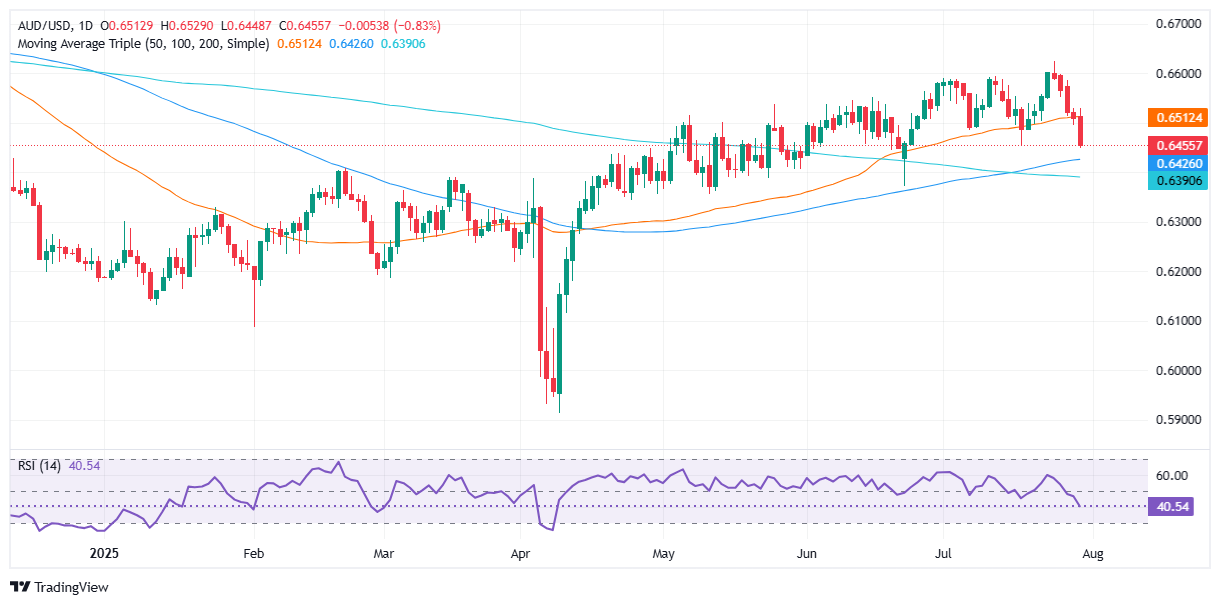AUD/USD tumbles as Fed keeps rates in check, Powell on the spotlight
- Fed keeps rates steady; two Governors voted for a 25-bps cut.
- Statement flags “elevated uncertainty” and moderate growth in H1.
- EUR/USD trades choppy near 1.1475, eyes key support at 1.1450.
The AUD/USD plunges on Wednesday, extending its agony for fourth straight days after the Federal Reserve (Fed) decision to hold rates, thought not unanimously as two officials Waller and Bowman, who telegraphed their intentions before the blackout period, dissented and voted for a 25 bps rate cut. At the time of writing the pair trades volatile within 0.6448, down 0.76%.
In its latest policy statement, the Federal Reserve noted that economic activity has moderated during the first half of the year, while the unemployment rate remains low and inflation is described as “somewhat elevated.” Officials reiterated their commitment to achieving maximum employment and bringing inflation back to the 2% target, while emphasizing that “uncertainty about the economic outlook remains elevated.”
The Fed also confirmed it will continue reducing its holdings of Treasury securities, agency debt, and mortgage-backed securities. Markets now shift focus to Fed Chair Jerome Powell’s press conference, which is currently underway.
AUD/USD reaction to Fed’s decision
The AUD/USD trades volatile within the 0.6454-0.6471 range set by the reaction to the Fed’s decision, capped on the upside by the 0.6500 figure ahead of the 50-day SMA at 0.6536. If Chair Powell turns dovish during the Q&A, expect a test of higher prices.
Conversely, a hawkish reaction paves the way to test the day’s low of 0.6424, where the 100-day SMA lies, followed by the 0.6400 mark and the 200-day SMA at 0.6394.

Fed FAQs
Monetary policy in the US is shaped by the Federal Reserve (Fed). The Fed has two mandates: to achieve price stability and foster full employment. Its primary tool to achieve these goals is by adjusting interest rates. When prices are rising too quickly and inflation is above the Fed’s 2% target, it raises interest rates, increasing borrowing costs throughout the economy. This results in a stronger US Dollar (USD) as it makes the US a more attractive place for international investors to park their money. When inflation falls below 2% or the Unemployment Rate is too high, the Fed may lower interest rates to encourage borrowing, which weighs on the Greenback.
The Federal Reserve (Fed) holds eight policy meetings a year, where the Federal Open Market Committee (FOMC) assesses economic conditions and makes monetary policy decisions. The FOMC is attended by twelve Fed officials – the seven members of the Board of Governors, the president of the Federal Reserve Bank of New York, and four of the remaining eleven regional Reserve Bank presidents, who serve one-year terms on a rotating basis.
In extreme situations, the Federal Reserve may resort to a policy named Quantitative Easing (QE). QE is the process by which the Fed substantially increases the flow of credit in a stuck financial system. It is a non-standard policy measure used during crises or when inflation is extremely low. It was the Fed’s weapon of choice during the Great Financial Crisis in 2008. It involves the Fed printing more Dollars and using them to buy high grade bonds from financial institutions. QE usually weakens the US Dollar.
Quantitative tightening (QT) is the reverse process of QE, whereby the Federal Reserve stops buying bonds from financial institutions and does not reinvest the principal from the bonds it holds maturing, to purchase new bonds. It is usually positive for the value of the US Dollar.




